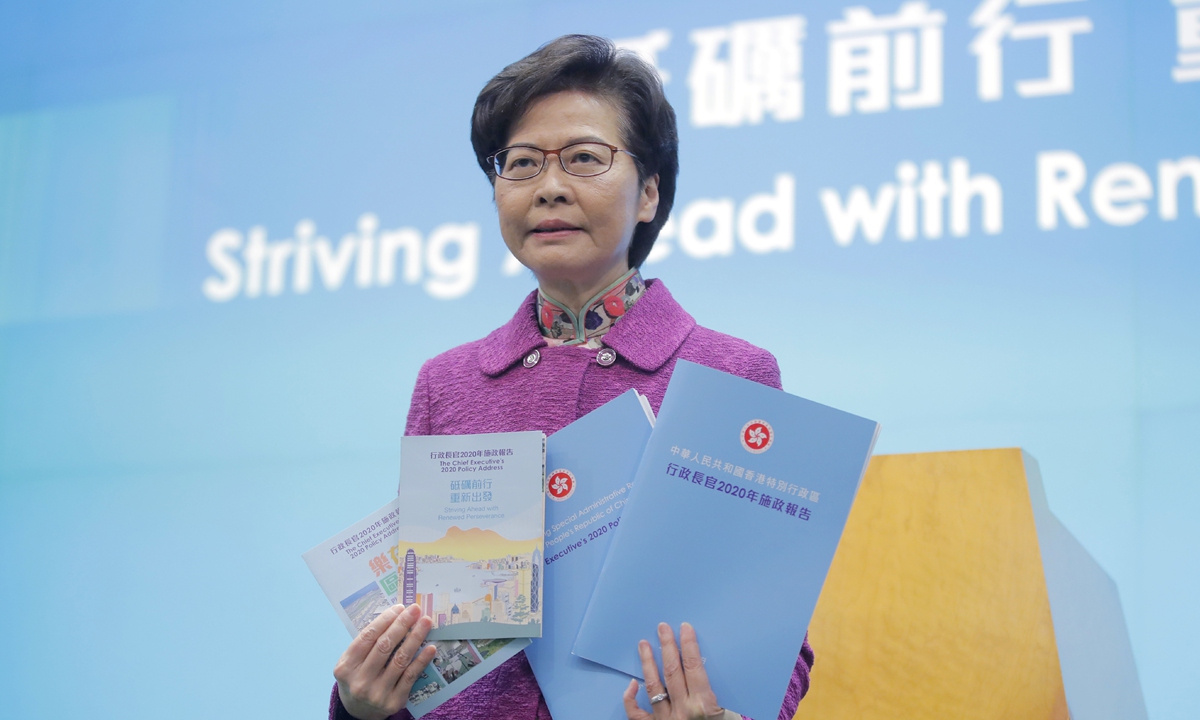Lam stresses youth's role in integration with national development
By Cui Fandi and Chen Qingqing Source: Global Times Published: 2020/11/26 0:58:40

Hong Kong Chief Executive Carrie Lam poses with copies of her policy address at a news conference in Hong Kong on Wednesday. Lam lauded the city's new national security law on Wednesday as "remarkably effective in restoring stability." Photo: AP
In her 2020 annual policy address, Chief Executive of the Hong Kong Special Administrative Region (HKSAR) Carrie Lam stressed the need to restore Hong Kong's constitutional order and political system from yearlong social turmoil, putting a special focus on the city's further integration into China's development plans, and creating more conditions for the young generation to achieve this goal.
Compared to previous annual policy addresses, Lam discussed more about sovereignty and the national security together with issues concerning people's livelihood. For the first time, Lam wore a badge of China's national flag and the HKSAR's regional flag on her suit publicly while delivering the policy address, which vividly underscored her reinforced commitment to the "one country, two systems" principle.
This was the first policy address since the national security law for Hong Kong was implemented in June, which helped effectively ended months of social turmoil and anti-government riots. While releasing a slew of new policies to help Hong Kong tide over the toughest political challenges since its return to the motherland, the policy address clearly delivered a message of restoring the constitutional order as the top priority.
The city gets the central government's full support in putting forward and implementing concrete measures in various areas in social livelihood, economy, education and public health, the official said.
"Nearly one-eighth of the address was devoted to the central government's implementation of 'one country, two systems' to ensure the prosperity and stability of Hong Kong," Hong Kong LegCo member Junius Ho Kwan-yiu told the Global Times on Wednesday.
"It is natural that as head of Hong Kong, the Chief Executive's urgent task is to put constitutional order and political system of the HKSAR back in order," Ho noted.
To restore Hong Kong's constitutional order and political system from chaos, Lam proposed measures to improve the oath-taking process for civil servants and strengthen legal education for young people.
To implement the Basic Law, the requirements of the National Security Law, as well as the interpretation and decision of the Standing Committee of the National People's Congress (NPC) on the qualifications of LegCo members, the HKSAR government will introduce a bill with reference to relevant local court judgments within the year to amend such local laws as the Oaths and Declarations Ordinance and the Legislative Council Ordinance to enhance the oath-taking arrangements, and to deal with those who have engaged in conduct that breaches the oath after swearing-in, as well as the legal consequences and the relevant statutory procedures involved.
Lawmakers will be disqualified for office immediately after they are determined by law to have failed to meet the legal requirements of upholding the Basic Law, and honoring the pledge of allegiance to Hong Kong.
Lam also stressed the importance of legal education for the younger generation. The Department of Justice is committed to implementing the 10-year plan called "Vision 2030 — A Focus on the Rule of Law" by working with various stakeholders to launch a more focused public education campaign, including educating young people on the correct concept of the rule of law, and enhancing their awareness of the need to abide by the law.
"The policy address places special emphasis on the younger generation in Hong Kong, providing them with favorable conditions for their full integration into the overall development of the country, and their active participation in the construction of the Greater Bay Area," Kennedy Wong Ying-ho, a solicitor at the Supreme Court of Hong Kong, told the Global Times.
The policy address also outlines how Hong Kong could further integrate into the Greater Bay Area, with measures including tax concessions, facilitation of property purchases, support for young entrepreneurs, cross-boundary remittance of science and technology funding, and liberalization of legal and construction professional services.
The Greater Bay Area Youth Employment Scheme will be unveiled to encourage mainland companies that do business in Hong Kong and the Greater Bay Area to hire university graduates from Hong Kong, which will provide 2,000 slots. Hundreds of them will have positions in innovation and technology, with generous subsidies from the SAR government.
Lam also promoted quality education to nurture Hong Kong's students into law-abiding citizens with social responsibility and national identity. Lam suggested rectifying the city's liberal studies, as well as strengthening the training of teachers and principals to nurture residents' legal and national security awareness.
During the social turmoil in 2019, over 10,000 were arrested for violating the law, of which 40 percent were students, with nearly 2,000 elementary and middle school students, Lam said, noting that it exposed a serious lack of law-abiding awareness.
"Hong Kong is now in a critical period of development where we must adhere to the "one country, two systems" principle and eliminate the serious consequences of the violence in Hong Kong, actively integrate into the overall development of the country, and start afresh," Wong noted.
Posted in: HK/MACAO/TAIWAN